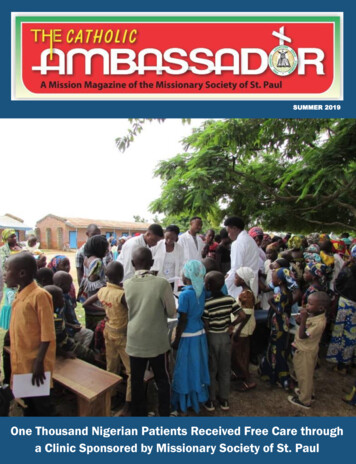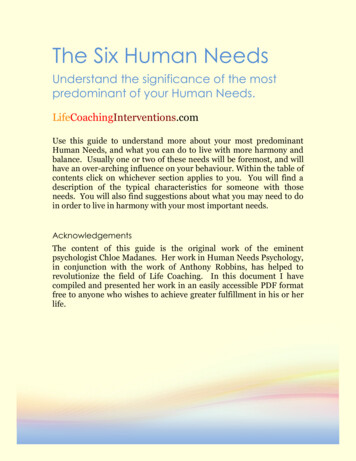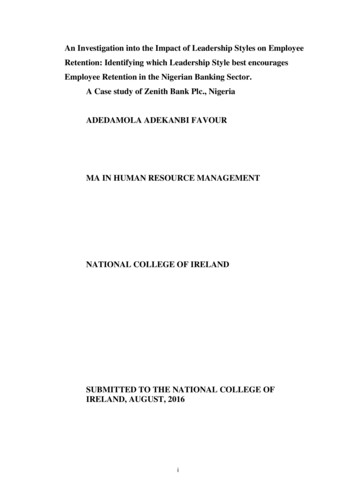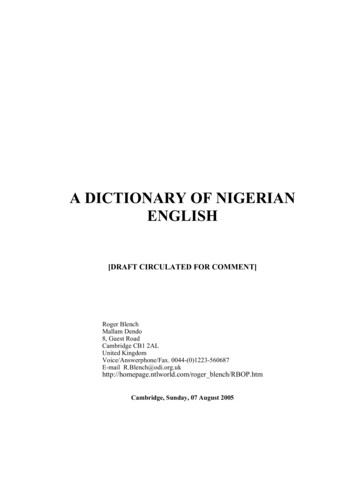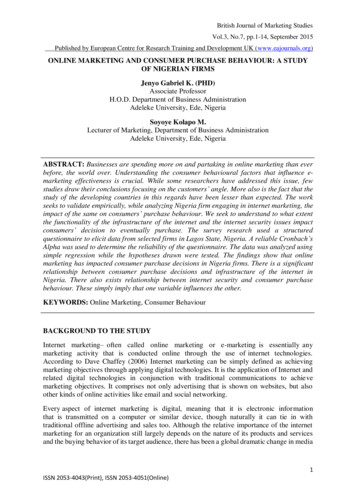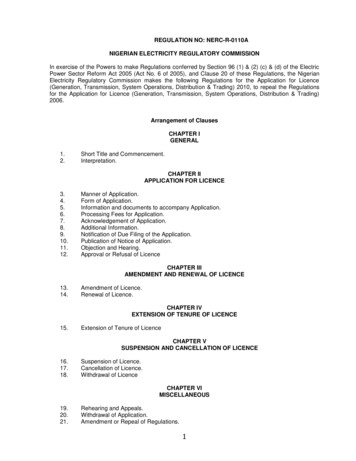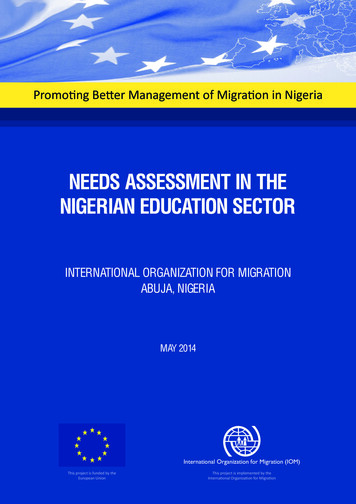
Transcription
Promoting Better Management of Migration in NigeriaNEEDS ASSESSMENT IN THENIGERIAN EDUCATION SECTORINTERNATIONAL ORGANIZATION FOR MIGRATIONABUJA, NIGERIAMAY 2014International Organization for Migration (IOM)This project is funded by theEuropean UnionThis project is implemented by theInternational Organization for Migration
The opinions expressed in the report are those of the authors and do not necessarily reflect the views of theInternational Organization for Migration (IOM). The designations employed and the presentation of materialthroughout the report do not imply the expression of any opinion whatsoever on the part of IOM concerning thelegal status of any country, territory, city or area, or of its authorities, or concerning its frontiers or boundaries.IOM is committed to the principle that humane and orderly migration benefits migrants and society. As anintergovernmental organization, IOM acts with its partners in the international community to: assist in meeting theoperational challenges of migration; advance understanding of migration issues; encourage social and economicdevelopment through migration; and uphold the human dignity and well-being of migrants.Publisher: International Organization for MigrationNo. 11 Haile-selassie StreetAsokoro DistrictAbujaTel.: 234 814 067 11 27Fax: 234 807 209 31 33E-mail: iomnigeria@iom.intWebsite: www.iom.int 2014 International Organization for Migration (IOM)All rights reserved. No part of this publication may be reproduced, stored in a retrieval system, or transmitted inany form or by any means, electronic, mechanical, photocopying, recording, or otherwise without the prior writtenpermission of the publisher.70 14
Promoting Better Management of Migration in NigeriaNEEDS ASSESSMENT IN THENIGERIAN EDUCATION SECTORINTERNATIONAL ORGANIZATION FOR MIGRATIONABUJA, NIGERIAMAY 2014International Organization for Migration (IOM)This project is funded by theEuropean UnionThis project is implemented by theInternational Organization for Migration
CONTENTSList of Tables. 7List of Figures. 7Acronyms and Abbreviations.9Executive Summary. 11CHAPTER 1Introduction. 131.1 Background. 131.2 Purpose and Objectives. 141.3 Specific Objectives of the Needs Assessment. 141.4 Specific Activities. 14CHAPTER 2Methodology. 152.1 Study Design. 152.2 In-depth Interviews with Key Informants. 162.3 Briefs on Agencies Selected for Data Collection. 162.4 Desk Review of Documents . . 172.5 Needs Assessment Tools. 182.6 Study Limitations and Challenges . . 19CHAPTER 3Overview of the Nigerian Education Sector. 213.1 Structure of the Nigerian Education Sector. 213.2 Access to Quality Education. 233.3 Administration of the Nigerian Education Sector. 253.4 Challenges of Quality Education. 263.5 Teacher Education and Preparation. 27CHAPTER 4Review of Documents and Policies . 294.1 Nigeria’s Vision 20:2020 . . 294.2 National Economic Empowerment and Development Strategy. 294.3 National Policy on Education. 304.4 National Road Map for the Education Sector. 30NEEDS ASSESSMENT IN THE NIGERIAN EDUCATION SECTOR5
4.5 Labour Migration Policy for Nigeria. 304.6 World Bank Analysis of the Nigerian Education Sector. 314.7 UNESCO Reports on Nigerian Education. 324.8 Report on Needs Assessment of Nigerian Public Universities. 324.9 Research on Teachers’ Skills and Competencies. 334.10 Diaspora Skills and Competency Exchange Programmes. 344.11 Administrative Structures for Managing Diaspora Issues in Nigerian Universities. 35CHAPTER 5Results and Discussion. 395.1 Number, Composition and Qualifications of Personnel in the Education Sector. 395.2 Skill and Competency Gaps in the Education Sector. 425.3 Addressing Skill and Competency Gaps. 435.4 Existing Diaspora Skills Exchange Programmes in Tertiary Education. 45CHAPTER 6Conclusion and Recommendations. 496.1 Policy Environment for Diaspora Engagement in Education. 496.2 Need for Diaspora Engagement in the Education Sector. 496.3 Modalities for Diaspora Engagement in Education. 496.4 Disciplines and Competencies Requiring Diaspora Engagement. 506.5 Leveraging Existing Diaspora Engagement Programmes. 506.6 Difficulties in Attracting Diaspora to Engage in Education . 506.7 Improving Working Conditions for Nigerian Academics. 506.8 Insecurity and Diaspora Engagement. 506.9 Diaspora Engagement through Virtual Participation . 516.10 Establishment of a Diaspora Office in Tertiary Institutions . 516.11 Establishment of a Reliable National Diaspora Database . . 51Bibliography. 53Appendix 1. 57Appendix 2. 61NEEDS ASSESSMENT IN THE NIGERIAN EDUCATION SECTOR6
LIST OF TABLES2.1 Data collection regimen . 152.2 Schedule of key-informant interviews. 163.1 Growth in the number of universities in Nigeria. 243.2 Unified Tertiary Matriculation Examination applicants and tertiary admissions, 2004–2013. 255.1 Number and composition of personnel in the education sector. 395.2 Qualifications of teachers. 405.3 Distribution of qualified and unqualified teachers. 405.4 Teacher shortage in Nigeria. 415.5 Qualitative analysis of extent and areas of teacher shortage. 425.6 Proportion of teachers with professional competencies. 43LIST OF FIGURES3.1 Structure of the Nigerian education system. 21NEEDS ASSESSMENT IN THE NIGERIAN EDUCATION SECTOR7
ACRONYMS ANDABBREVIATIONSADFAfrican Diaspora FellowDFIDDepartment for International DevelopmentEFAEducation for AllEUEuropean UnionFMEFederal Ministry of EducationHNDHigher National DiplomaICTInformation and Communications TechnologyILOInternational Labour OrganizationIOMInternational Organization for MigrationLEADSLinkages with Experts and Academics in the Diaspora SchemeMDGMillennium Development GoalsMIDAMigration for Development in AfricaMoEMinistry of EducationNBTENational Board for Technical EducationNCCENational Commission for Colleges of EducationNCENigeria Certificate in EducationNEEDSNational Economic Empowerment and Development StrategyNISNigeria Immigration ServiceNNVSNigerian National Volunteer ServiceNPENational Policy on EducationNUCNational Universities CommissionOAUObafemi Awolowo UniversityOIPOffice of International ProgrammesSUBEBState Universal Basic Education BoardUIUniversity of IbadanUBECUniversal Basic Education CommissionUNESCOUnited Nations Educational, Scientific and Cultural OrganizationUNILAGUniversity of LagosUTMEUnified Tertiary Matriculation ExaminationNEEDS ASSESSMENT IN THE NIGERIAN EDUCATION SECTOR9
EXECUTIVE SUMMARYThis report presents the results of a needs assessment survey of the education sector in Nigeria. The survey wasconceptualized to identify skill and competency gaps in the education sector. The goal of the assessment was toprovide the Government with recommendations on how identified skill and competency gaps in education could beaddressed. It was envisaged that the outcome of this assessment would provide the Government with necessaryinformation on existing skill and competency gaps in the education sector in order to support the Nigeria NationalVolunteer Service (NNVS) to develop its outreach to identify Nigerians in diaspora who are willing to contribute theircompetencies and skills towards the development of the education sector.The needs assessment utilized a research design of a mix-method of data collection procedures. These include acomprehensive desk review of relevant needs assessment documents in the education sector, a survey questionnaireresponded to by relevant government officials, and semi-structured in-depth interviews with chief executives ofcommissions or agencies which superintend the three strata of the Nigerian education sector.The results of the needs assessment survey indicate the presence of an enabling policy environment for diasporaengagement in the Nigerian education sector. The results show that there are currently debilitating skill andcompetency gaps in the nation’s education sector. Analysis of both qualitative and quantitative data reveals acuteskill gaps in the core disciplines of science, foreign languages, mathematics and basic technology at the basic andpost-basic education levels while special education, computer science, technology, law, engineering, medicine andsurgery were identified as domains of skills shortage in tertiary education. Results of the assessment further revealthat teachers at all levels of education generally lack information and communications technology (ICT), counsellingand pedagogical competencies. The results also show that lack of modern infrastructure, scarcity of teachingmaterials and inadequate research equipment in Nigerian educational institutions are push factors for the exodusof Nigerian academics to other countries in search of greener pastures.Based on the results of the assessment, it is clear that diaspora engagement in Nigerian education should berestricted, at least for now, to interventions at the tertiary level of education. Though skill shortages requiringdiaspora intervention were found at the lower levels of education, institutional administrative structures werelacking to manage diaspora engagement at the basic and secondary education levels. General improvement inworking conditions of workers in the sector is crucial if those in the diaspora are to be persuaded to return home tocontribute to educational development even on a short-term basis.Consequent upon the results of the assessment, it is recommended that the Government, educational institutions,development partners and other stakeholders in the education sector should explore diaspora virtual participationas an intervention strategy to target diaspora who are willing to contribute their knowledge, skills and competenceto the Nigerian education sector but are not willing to return to Nigeria. The Federal Ministry of Education (FME)should direct all tertiary institutions to set up offices mandated with the mission of working closely with diasporas.The Government should collaborate with relevant organizations and agencies to obtain current and accurate dataon Nigerian academics in the diaspora in order to facilitate their engagement in the education sector. IOM shouldincrease its technical assistance to Nigeria to enable it to generate and update its national diaspora database.NEEDS ASSESSMENT IN THE NIGERIAN EDUCATION SECTOR11
CHAPTER 1INTRODUCTION1.1BackgroundNigeria has the largest population of African people in the world. With a population of approximately 167 millionpeople,1 the country has networks of diaspora communities spread across many countries. It is estimated that about15 million Nigerians work abroad and attract high volumes of remittances to Nigeria yearly. In 2012, statistics fromthe Central Bank of Nigeria on official remittances indicate that Nigerians in the diaspora remitted about 21 billiondollars,2 with the possibility that the figure might increase in subsequent years as a result of current interventionsto engage Nigeria diaspora for national development.There had been increasing evidence of Nigeria’s huge diaspora population constituting a potent force for nationaldevelopment. Such evidence generally focused on financial contributions of remittances and investments. Ofrecent, however, is the growing awareness of the diaspora population’s non-financial contributions to nationaldevelopment. In addition to remittances, it is recognized that diaspora members can be encouraged to contributetheir competencies and skills to national development, especially in the critical sector of education.It has been recognized also that Nigerians in the diaspora who attract remittances to the country contribute mainlyto short-term economic empowerment of relatives and immediate family members. Though remittances may havesome impact on national economy, there is a need to fashion out strategies by which Nigerian diaspora communitiesare encouraged to contribute to national development through sustainable and well-coordinated platforms ofknowledge and skills transfer. The process of encouraging skills and knowledge flow from the diaspora to Nigeria forthe development of the education sector is in recognition of the relevance and usefulness of diaspora’s skills andcompetencies in that sector.In its concerted efforts to leverage the knowledge, skills and experience of Nigerian professionals abroad fornational development, the Nigerian Government began in 1999 the process of effectively engaging Nigerians in thediaspora to contribute to various sectors of the nation’s development. In the education sector, the highest level ofgovernment initiative to mobilize Nigerians in the diaspora to revitalize the nation’s higher education system wasthe appointment of three Nigerian diaspora academics as Vice Chancellors of three newly established universitiesin 2011. The immediate consequence of the appointments was the ease at which the new Vice Chancellors wereable to attract other eminent Nigerian professors in the diaspora to return home to work as pioneer professors inthe new universities.It is apparent that the strength and sustainability of the process of engaging diaspora in Nigeria’s education sectordepend, to a large extent, on the technical assistance of international development partners in improving thecapacity of the Government to manage migration in order to maximize its development potentials. The InternationalOrganization for Migration (IOM), among other State actors in Nigeria, is taking a lead in this process.In 2012, IOM Nigeria began the implementation of a project funded by the European Union which aimed at promotingbetter management of migration in Nigeria. The overall objective of the project was to enhance the capacity of theGovernment to manage migration in order to maximize its development potentials. With diaspora mobilizationbeing a key component of the project, IOM has been providing technical support to the Nigerian National VolunteerService (NNVS) to strengthen its capacity to fulfill its mandate of mobilizing the Nigerian diaspora for nationaldevelopment. The current project is part of IOM’s efforts to enhance the capacity of the NNVS to engage andmobilize diasporas for development through investment schemes and temporary return of highly qualified diasporamembers to Nigeria.1 National Population Commission, 2012.2 World Bank, 2012.NEEDS ASSESSMENT IN THE NIGERIAN EDUCATION SECTOR13
One major type of technical support which IOM has provided to the NNVS to achieve its mandate is the developmentof an online portal to facilitate a system for registration of Nigerians in the diaspora. The portal was developed toenable the NNVS to secure substantial information on sociodemographic characteristics, geographic location andprofessional profiles, as well as gauge their willingness to invest in Nigeria. While registration was intended to createa database of all Nigerians in the diaspora, the mapping targeted Nigerians in the health and education sectors inthree pilot countries, namely South Africa, the United Kingdom and the United States.To complement the outcome of the mapping exercise, it became expedient for IOM to conduct a needs assessmentof Nigeria’s education sector to identify skill and competency gaps in the sector. It was envisaged that the outcomeof this process would provide the Government of Nigeria with necessary information on the existing skill gaps inits education sector in order to support the NNVS to develop its outreach capacity to identify Nigerians who werewilling to contribute their competencies and skills towards national development in the sector. Encouraging skillsand knowledge flow from the diaspora to the country of origin for national development, otherwise called braingain, is in recognition of the presence of relevant skills and competencies in the diaspora that could be harnessedfor national development alongside remittances sent by the diaspora.1.2Purpose and ObjectivesThe main purpose of the needs assessment of the education sector was to identify skill and competency gaps in thesector and provide the Government with recommendations on how the gaps could be addressed. The data gatheredwould assist the Government to establish a matching system to mobilize the diaspora for national developmentthrough a pilot scheme to encourage the temporary or permanent return of highly skilled diaspora members tocontribute to national development in the education sector.1.3Specific Objectives of the Needs AssessmentThe needs assessment was designed to: Determine the number, composition, qualifications of personnel in the education sector; Analyse available skills and competencies in the education sector; Identify skill and competency gaps in the education sector; Determine how identified skill and competency gaps in the education sector can be addressed; Identify strengths, challenges and weaknesses of existing skills and competency exchange programmes withthe Nigerian diaspora.1.4Specific ActivitiesTo achieve the objectives of the needs assessment, the following specific activities were carried out at differentstages: Development of assessment tools and a work plan for the needs assessment exercise; Development of a questionnaire to gather data on the number, composition and qualifications of personnelin the education sector; Visit to stakeholders implementing similar programmes, such as the National Universities Commission; Identifying the strengths, challenges and weaknesses of existing skills and competency exchange programmeswith the N
the Central Bank of Nigeria on official remittances indicate that Nigerians in the diaspora remitted about 21 billion dollars,2 with the possibility that the figure might increase in subsequent years as a result of current interventions to engage Nigeria diaspora for national development.



